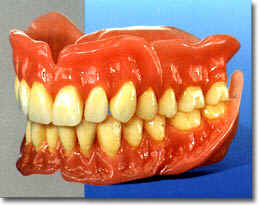Discover comfortable fitting dentures

Making the most of your your dentures
|
Welcome to the world of denture wearing! It's a big world. For today, more than 5 million Canadian adults are wearing dentures. That is more than one out of every four people in Canada! So wearing dentures really is not unusual. And when approached positively and used properly, dentures can become almost as natural as putting on your shoes in the morning and taking them off at night. Your Custom Made Dentures Your Denturist spends a great deal of time and skill in fabricating your dentures "Custom-made" based on your denture needs. It is important to follow instructions concerning their proper use and care. As a denture wearer you must realize that new dentures will feel strange and unnatural at first, and that you must spend some time and effort in learning to adjust to them before they become second nature |
| Adjusting to your Custom Made Dentures |
|
|
Denture feel Excess Saliva Speaking Eating |
|
Denture Care |  |
| The supporting bone and tissue in your mouth need regular rest from denture wearing. Therefore, it is important that you take your dentures out every day for a brief time or overnight. The best place to store them is in a special water-filled plastic container called a Denture Bath. This procedure will prevent
your dentures from drying out, which can, in time, adversely affect their fit.
|
|
Retentive Aids Why? When? and Which to use? During the break-in period, a denture adhesive can provide added comfort and confidence while you are relearning your eating and speaking skills. And if you have an overly thin ridge of supporting bone, or an abnormality in your supporting tissues, a denture adhesive may be a necessary retentive aid. Certain medications and even weight loss may also interfere with denture fit. You may simply desire an adhesive for the extra stability it offers. Your Denturist can recommend adhesives to meet your denture needs. The two basic types of denture adhesives used often are, powders and creams. Powder adhesives are usually recommended for patients with normal anatomical mouth structures to help them adapt more easily to their new dentures. The thin adhesives gel created by the powder reinforces the seal between the denture and underlying tissue so that air, saliva or food particles cannot seep in and disturb the perfect fit. Cream adhesives provide extra comfort and cushioning that's often needed to overcome difficulties for patients with descending abnormalities such as bony ridges and abruptly descending palates. The softer creams also help cushion tender tissue during the healing period after tooth extraction. Your Denturist may advise you to try a cream to help provide extra stability in the more difficult lower denture. A denture adhesive is not a substitute for dentures
that have loss their perfect fit through natural changes in
the mouth or destructive habits such as gum chewing, nail biting and teeth grinding.
Therefore, it is important that you see your Denturist twice a year for a denture checkup to see if a refitting or relining may be needed. |
|
Home Care Check List
|
Denture Inquiries & Appointments click here |
Home page top Denture Information
Thank you for your time!

 Mr. Chipps
Mr. Chipps